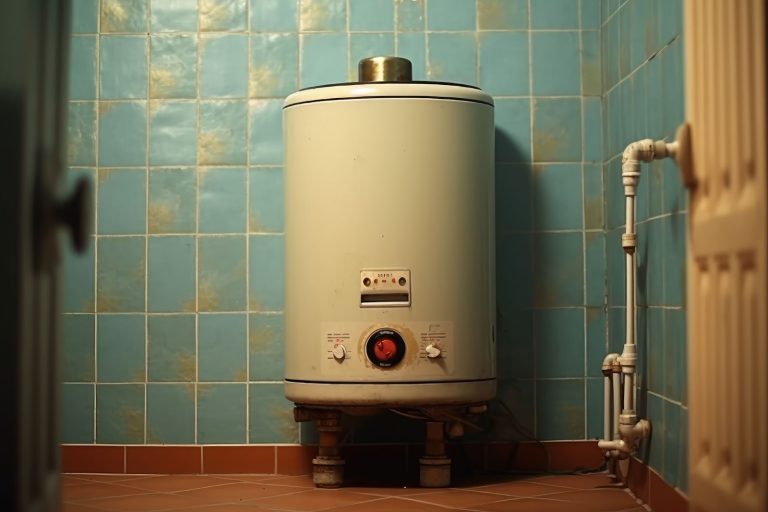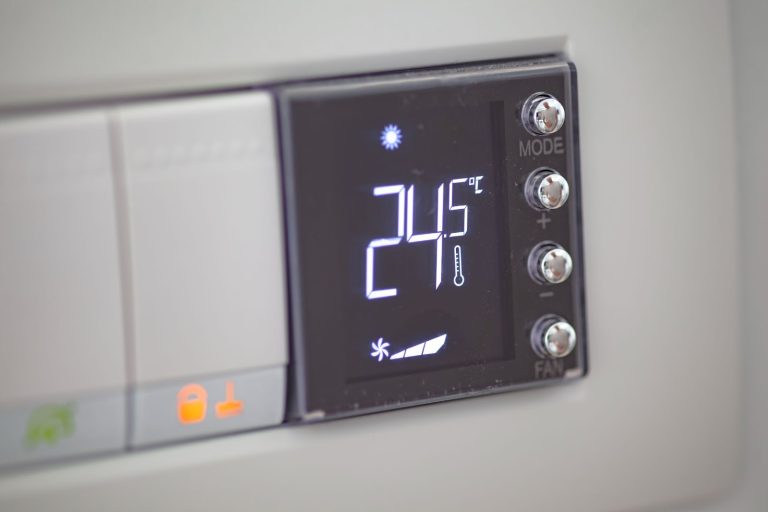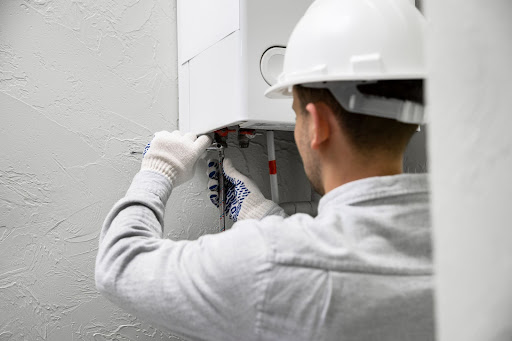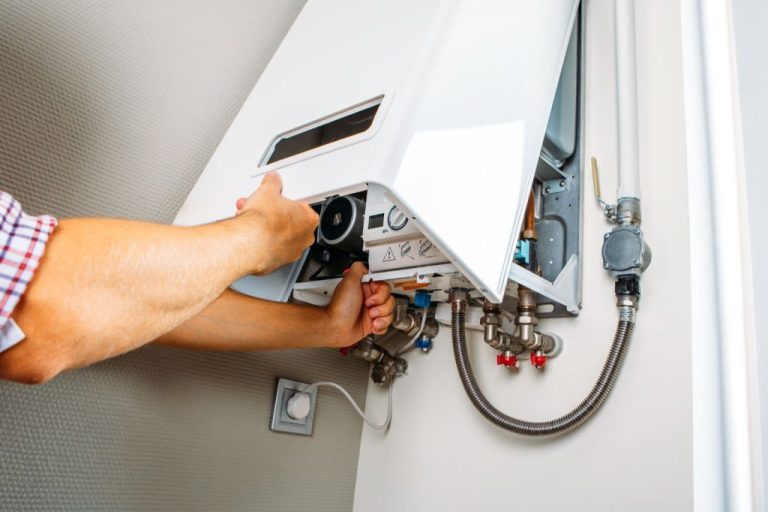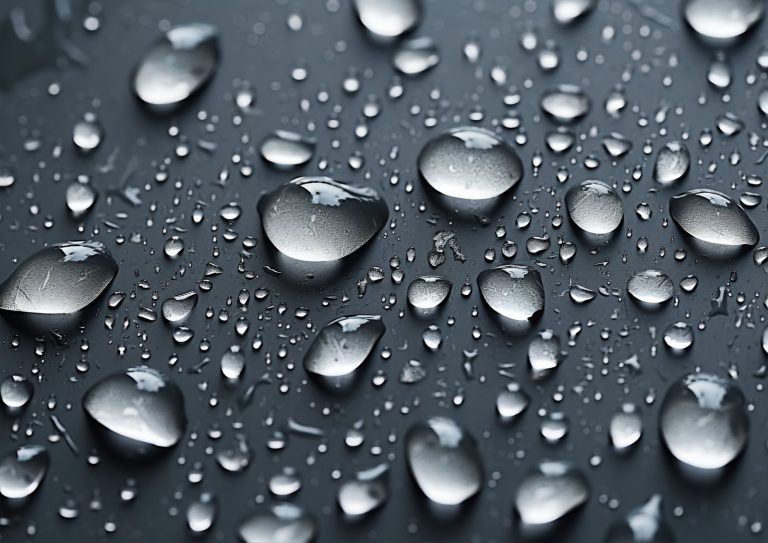What Happens When A New Boiler Is Fitted?
August 21, 2023
Hiring an experienced gas engineer is crucial. They will ensure that your new boiler system, radiators, and thermostat are set up correctly, minimising any potential risks or issues. Upgrading to a new boiler offers several benefits, including improved energy efficiency and enhanced performance for your central heating system. Make sure to hire a safe engineer for the installation process.
So, whether you’re considering a combi boiler installation or looking to replace your existing system with a more efficient one, understanding how an accredited installer handles the installation process of radiators, thermostats, and pipes is key. Let’s dive into the details of how a professional heating engineer handles the installation from start to finish.
Ready to learn more about the fascinating world of boilers and central heating systems? Let’s get started with understanding the role of a gas engineer in installing and maintaining these systems. Boilers are essential for heating water, which is then circulated through pipes to provide warmth in buildings. It’s important to ensure that the flue, a pipe that removes waste gases, is properly installed and functioning correctly.

Removal of old boiler and disposal options
One of the crucial steps in installing a central heating system is removing the old boiler. This ensures that the installation process, carried out by a gas engineer, goes smoothly and efficiently. Let’s delve into why the removal of an old boiler, along with any associated pipes, is necessary and explore the various disposal options available to the installer.
The need to remove the existing boiler before fitting a new one
Before the installation of a new combi boiler, it’s important to say goodbye to the old one. This removal process ensures a clean slate for the installer, allowing them to inspect the surrounding area, radiators, and pipework. It also prevents any issues from the previous boiler carrying over to the new one, providing a better service for your home.
Different disposal options for old boilers
Once you’ve successfully removed your old boiler as a home engineer, you might wonder what to do with it.
Thankfully, there are several disposal options available for this service:
- Consider recycling your old boiler as an environmentally friendly option. Many components can be repurposed or recycled through specialised facilities. If you need the service of a home engineer, contact us.
- Trade-in programs: Some manufacturers or heating companies offer trade-in programs where you can exchange your old boiler for a discount on a new one. This is a great option for homeowners looking to upgrade their heating systems and save money.
- Local authorities: Check with your local authorities regarding their guidelines for disposing of household appliances like boilers. They may have specific collection points or recycling schemes in place for engineers.
Potential environmental considerations when disposing of an old boiler
Disposing of an old boiler as an engineer requires us to consider its impact on the environment.
Here are some key environmental factors for engineers to consider:
- It is important to be aware of the presence of hazardous materials in boilers. Boilers often contain substances such as asbestos or heavy metals like lead or mercury. Proper handling and disposal are crucial to prevent these materials from entering landfills or causing harm.
- Upgrading to a modern combi boiler is a great way to improve energy efficiency. By doing so, you can help reduce carbon emissions and conserve energy.
- Boiler manufacturing processes contribute to carbon emissions, making it important for us to recycle or dispose of our old boilers properly. By doing so, we can indirectly reduce our overall carbon footprint and help protect the environment. As an engineer, it is crucial to be mindful of our impact on the environment and take steps to mitigate it.
Cost considerations for boiler installation
Installing a new boiler is not only about improving the functionality of your heating system, but it also involves various cost considerations for an engineer. Understanding these factors can help you make an informed decision and budget accordingly. Let’s delve into the key elements that influence the cost of fitting a new boiler for an engineer.

Size and type of matter
One of the primary factors that affect the cost of installing a new boiler is its size and type. Boilers come in different sizes to accommodate varying heating needs, so it’s essential to choose the right one for your home. A larger property may require a more powerful boiler, which can be pricier than smaller models. There are different types of boilers available, such as gas boilers, oil boilers, or electric boilers. Each type has its own price range and installation requirements.
Additional costs to consider
Beyond the initial purchase price of a new boiler, there are additional costs associated with installation that should be taken into account. Labour charges play a significant role in determining the overall cost. Hiring a professional installer ensures proper setup and reduces the risk of future complications.
Moreover, materials needed for installation can add up to the expenses. This includes pipes, valves, fittings, and other components necessary for connecting the boiler to your existing heating system.
In some cases, upgrading your current infrastructure may be required to ensure compatibility with the new boiler. For instance, if you’re switching from an older oil-fired boiler to an energy-efficient gas-powered one, you might need to install a gas supply line or modify your ventilation system. These upgrades contribute to additional costs but are crucial for optimal performance.
Long-term savings with energy-efficient boilers
While installing a new boiler incurs upfront costs, it’s important to consider potential long-term savings associated with energy efficiency. Energy-efficient boilers are designed to minimise heat loss during operation and reduce fuel consumption compared to older models.
By investing in an efficient boiler, you can expect lower energy bills over time. These savings can offset the initial installation costs and provide financial relief in the long run. Energy-efficient boilers are more environmentally friendly, as they contribute to reduced carbon emissions.
Gas and water supply during installation
During the installation of a new boiler, it is crucial to ensure proper gas and water supply connections. This ensures the safe and efficient operation of the heating system. Gas and water supplies are essential components that need to be carefully addressed by professionals to avoid any potential issues.
Importance of ensuring proper gas and water supply connections during installation of a boiler service. Whether you have a main boiler, system boiler, or combi boiler, it is crucial to prioritise the correct installation of gas and water supply connections.
One cannot underestimate the significance of proper gas and water supply connections. These connections are vital for the functioning of the boiler, as they provide the necessary fuel (gas) and medium (water) for heat generation.
To guarantee a secure connection, accredited installers who are familiar with building regulations should be hired for boiler service. These professionals possess the expertise required to handle gas and water supplies safely when installing a combi boiler, combination boiler, or system boiler. They have undergone rigorous training, ensuring they can carry out installations in compliance with industry standards.
Highlighting safety measures taken by professionals during new boiler installation to ensure secure connections. Whether it’s an oil boiler or a combi boiler installation, professionals prioritise safety when connecting the boiler type.
Gas engineers play a critical role in ensuring that the gas supply is correctly connected during boiler installations. They follow strict safety protocols set by Gas Safe, an organisation responsible for maintaining high standards in gas safety. These engineers conduct thorough inspections before connecting the gas pipe to the boiler.
Similarly, when dealing with water supply, plumbers or heating engineers take necessary precautions. They assess existing plumbing systems and determine if any modifications are needed to accommodate the new boiler’s requirements. This includes checking water pressure levels, inspecting storage tanks (if applicable), and evaluating pipework conditions.
Briefly mentioning potential issues that may arise during combi boiler installation if gas or water supply is not properly addressed.
If gas or water supply connections are not adequately addressed during boiler installation, various problems can arise:
- Gas leaks: Improperly connected or faulty gas pipes can lead to hazardous leaks within your home.
- Inefficient heating: Insufficient hot water production or inadequate heat output may occur if there are issues with the water supply.
- Water pressure problems: Incorrectly connected pipes or inadequate water pressure can result in reduced flow rates and an unsatisfactory heating experience.
- Safety hazards: Neglecting proper gas and water connections can pose serious safety risks to inhabitants, including potential fires, explosions, or flooding.
To avoid these issues, it is crucial to hire a qualified professional who will ensure that the gas and water supplies are properly addressed during the installation process.
Upgrading pipework and functionality checks
There are several important factors to consider. Upgrading the pipework and performing functionality checks are crucial steps that professionals undertake to ensure optimal performance and efficiency of the new system.
Upgrading Pipework for the New Boiler System
One of the key aspects of fitting a new boiler is upgrading the existing pipework. This is necessary because different boilers may have varying requirements in terms of pipe size, material, and layout. The upgraded pipework ensures proper water flow, adequate pressure, and efficient heat distribution throughout the heating system.
Professionals will carefully assess the condition of the current pipework and determine if any modifications or replacements are needed. In some cases, they may need to install entirely new pipework to meet the specifications of the new boiler. By doing so, they can guarantee that your heating system operates at its best capacity.
Upgraded pipework offers numerous benefits beyond just accommodating the new boiler. It can significantly improve heating efficiency by minimising heat loss during circulation. With improved insulation and modern materials, you can expect reduced energy consumption while enjoying consistent warmth throughout your home.
Furthermore, upgrading pipework can also help reduce maintenance needs in the long run. Old pipes tend to accumulate debris, rust, or sludge over time which can impact both performance and reliability. By installing new pipework during a boiler upgrade, you minimise the risk of blockages or breakdowns caused by deteriorating pipes.
Functionality Checks for Optimal Performance
In addition to upgrading pipework, professionals conduct thorough functionality checks on all components of your heating system after fitting a new boiler. These checks ensure that everything is functioning as intended and that there are no underlying issues that could affect performance or safety.
During these checks, experts examine various elements such as valves, thermostats, pressure gauges, and expansion vessels. They verify if each component is operating correctly and adjust settings if necessary. Professionals will also inspect the system filter to ensure it is clean and functioning effectively.
System filters play a crucial role in preventing debris and sludge from entering the boiler and causing damage. By regularly checking and cleaning the filter, professionals can maintain optimal performance and prolong the lifespan of your new boiler.
By conducting these functionality checks, professionals provide you with peace of mind knowing that your heating system is operating at its best capacity. They identify any potential issues early on, allowing for timely repairs or adjustments before they escalate into major problems.
Time frame For Boiler Fitting
Installing a new boiler is an essential task that requires careful planning and execution. Homeowners often wonder how long the process takes from start to finish.
The duration can vary depending on several factors. One of the key considerations is the complexity of the installation itself. If your property has specific requirements or unique features, it may take longer to complete the fitting process.
Any additional work required during the installation can affect the overall time frame. For instance, if there are modifications needed to your existing heating system or if you require additional pipework, it may add extra time to the project.
On average, installing a new boiler can take anywhere from one to three days. However, it’s important to note that this is just an estimate and actual timelines may differ based on individual circumstances.
To ensure a smooth installation process, it is crucial to schedule your boiler fitting well in advance. This is particularly important during certain seasons when demand for installations tends to be high. Waiting until peak periods could result in delays as heating engineers might have limited availability.
Moreover, obtaining a building regulations certificate should also be factored into your timeline considerations. This certificate ensures that your new boiler meets safety standards and legal requirements. It typically takes a few weeks after installation for an engineer to assess and issue this certificate.
In some cases, homeowners might wonder whether they should wait until their current boiler breaks down before getting a new one fitted. While this might seem like a cost-saving approach in the short term, it’s worth considering that older boilers tend to be less energy-efficient and more prone to breakdowns as they age.
By proactively replacing your old boiler with a newer model, you not only enjoy improved energy efficiency but also reduce the risk of sudden malfunctions during colder months. It’s always better to plan and avoid any inconvenience that may arise from unexpected boiler failures.
Different Types Of Boilers And Their Installation Process
There are various types available in the market. Each type has its own unique features and installation requirements.
Types of Boilers
- Combi Boilers:
- Combining both a high-efficiency water heater and a central heating boiler in one compact unit, combi boilers are popular for their space-saving design.
- These boilers heat water directly from the mains, eliminating the need for a separate hot water cylinder or storage tank.
- During installation, consideration must be given to ensure an adequate flow rate from the mains to meet hot water demands.
- System Boilers:
- System boilers work with an unvented hot water cylinder which stores pre-heated water for later use.
- They are suitable for larger properties with multiple bathrooms as they can supply hot water to several outlets simultaneously.
- Installation requires additional components such as expansion vessels and pumps to facilitate efficient operation.
- Conventional Boilers:
- Also known as regular or heat-only boilers, conventional boilers rely on a separate hot water cylinder and cold-water storage tank.
- These boilers are ideal for older properties with traditional heating systems already in place.
- The installation process involves locating both the cylinder and storage tank in appropriate spaces within the property.
Installation Processes
- Location Requirements: When fitting any type of boiler, it is crucial to consider its location carefully. Factors such as ventilation, flue position, proximity to windows or doors, and accessibility for maintenance should be taken into account.
- Additional Components: Depending on the type of boiler being installed, additional components may be necessary. For instance, combi boilers require pressure relief valves while system boilers need expansion vessels and circulating pumps.
- Considerations for Each Type:
- Combi Boilers: As combi boilers heat water directly from the mains, the installation process should ensure a suitable flow rate and pressure. Consideration must be given to the number of outlets requiring hot water simultaneously.
- System Boilers: The installation of system boilers involves connecting the boiler to an unvented cylinder. It is important to ensure proper integration of components such as expansion vessels and pumps for optimal performance.
- Conventional Boilers: Installing conventional boilers requires careful positioning of both the hot water cylinder and cold-water storage tank. Adequate space should be allocated for these additional units.
Final steps after boiler installation
When a new boiler is fitted, there are several important final steps to consider. These include the removal and disposal of the old boiler, cost considerations for the installation, ensuring proper gas and water supply during the process, upgrading pipework and performing functionality checks, as well as understanding the timeframe for the fitting. It is crucial to be aware of the different types of boilers available and their specific installation processes.
To ensure a smooth transition after boiler installation, it is essential to arrange for the proper removal and disposal of your old boiler. Consider environmentally-friendly options such as recycling or responsible waste management.
Cost considerations play a significant role in determining which boiler you choose and how much you invest in its installation. Take into account not only the initial purchase cost but also potential long-term savings on energy bills.
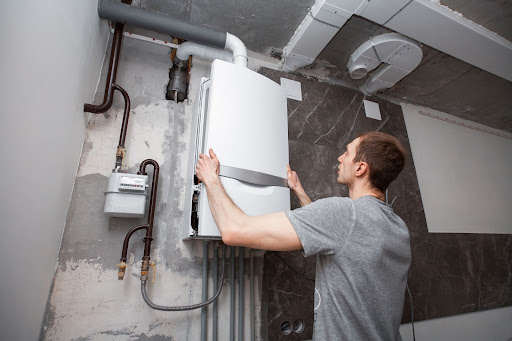
During installation, it is crucial to ensure that both gas and water supplies are properly connected to your new boiler. This will guarantee its optimal functioning and prevent any potential issues down the line.
Upgrading pipework may be necessary when installing a new boiler. It is important to check if existing pipework meets safety standards and make any necessary adjustments or replacements accordingly. Conducting functionality checks ensures that your new boiler operates efficiently and effectively.
Understanding the timeframe for fitting a new boiler allows you to plan accordingly. The duration can vary depending on various factors such as system complexity or additional requirements. Consult with professionals to get an accurate estimate.
Lastly, familiarise yourself with the different types of boilers available in the market and their respective installation processes. This knowledge helps you make an informed decision based on your specific needs and preferences.
In summary, when getting a new boiler fitted:
- Properly remove and dispose of your old boiler.
- Consider all costs associated with installation.
- Ensure gas and water supply connections are properly established.
- Upgrade pipework if required and perform functionality checks.
- Understand the timeframe for the fitting process.
- Learn about different types of boilers and their installation processes.
By following these final steps, you can ensure a successful boiler installation that meets your requirements. Don’t hesitate to consult with professionals for guidance and assistance throughout the process.
FAQs
Q: How long does it take to install a new boiler?
A: The duration of installing a new boiler can vary depending on factors such as system complexity and additional requirements. It is best to consult with professionals who can provide an accurate estimate based on your specific circumstances.
Q: What are the different types of boilers available?
A: There are various types of boilers available, including combi boilers, system boilers, and regular boilers. Each type has its own advantages and considerations. Researching and understanding these options will help you make an informed decision.
Q: Can I recycle my old boiler?
A: Yes, many components of old boilers can be recycled. It is recommended to explore environmentally-friendly disposal options such as recycling or responsible waste management services in your area.
Q: Do I need to upgrade my pipework when installing a new boiler?
A: Upgrading pipework may be necessary if your existing pipes do not meet safety standards or are incompatible with the new boiler. A professional installer will assess the situation and advise you accordingly.
Q: Are there any long-term cost savings associated with getting a new boiler fitted?
Yes, investing in a new boiler can lead to long-term cost savings through improved energy efficiency. Newer models often have higher efficiency ratings, resulting in reduced energy consumption and lower utility bills over time.

